Sounds like they tried to borrow from Metroid and return the favor of those games borrowing from the Alien franchise, but couldn't pull it off without being repetitive.
Alien Isolation
|
|
On 10/26/2014 at 09:59 PM by Michael117 See More From This User » |
The setup and purpose of this game
Alien Isolation appears to have been created with the intention of capturing the look and feel of Ridley Scott's film Alien. Not just to evoke that specific retro sci-fi aesthetic, but also to deliver the dread and tension of being confined in a space station with a terrifying creature. An agile creature that could attack you from any angle, who can't be outrun, and who will kill you on sight. Isolation shows an attention to detail, and a level of devotion to the universe it's built within, that is uncommon in video games. The visuals are stunning, the aesthetic and sound design are spot-on, and the second I was given control of the protagonist I already felt like I was in the middle of the Alien universe.
The main character is Amanda Ripley, the daughter of the film's heroine Ellen Ripley. Our story is set 15 years after the events of Alien, and 42 years prior to the sequel Aliens. Amanda has never received closure regarding her mother's disappearance, or learned of what transpired on her mother's ship.
Amanda, now a grown woman, is an engineer working for the infamous Weyland-Yutani corporation when she is informed that the flight recorder of her mother's lost ship, the Nostromo (which happens to be Weyland-Yutani property), has been discovered by a salvage team. The flight recorder has been delivered to a space station named Sevastopol, and Amanda joins a team to go the station and recover it. The whole game takes place in and around Sevastopol, a gigantic station in orbit around a gas giant. When you arrive things have clearly gone awry, and a search for answers begins, as well as a desperate fight for survival.
Where does this game fit in to the gaming landscape?
A conscious design effort to keep the player from feeling empowered in a dangerous environment is an element of game design that has witnessed a resurgence in the last few years, with prime examples being Amnesia: The Dark Descent, Outlast, and Slender. For many years prior to this resurgence, most horror games placed their focus on combat as the means to survival. A game where you are firing machine guns at anything that threatens you is still technically a survival game if you nitpick semantics of what surviving means, but in the world of video games the term survival has its roots in experiences where resources are scarce, and combat is a last resort.
Alien Isolation is currently the AAA poster-child for this resurgence in survival. There are weapons, but ammunition is scare. Engaging in combat will more often kill you than save you. And seeing as combat creates noise, it will guarantee that only more trouble heads your way.
At its core this is a stealth game experienced from the first-person perspective, and the world around you is full of threats that you need to evade or manipulate, and in the event that you get caught face-to-face with a threat you can use a wide array of hastily crafted gadgets to deter or slow down a pursuer.
The good
The mechanics at the core of Isolation are fantastic. If you've played Dishonored or Thief you will see that the mechanic of peeking around corners returns in Isolation, to great affect. You will crouch behind objects and slowly peak your head above, below, or to the side of cover to see what's happening around you. You probably won't understand what I mean unless you use the mechanic for yourself, but when I play Isolation I feel highly engrossed in the environments, and the peeking system works in such a way that you feel like you are hugging walls around you, or laying flat on your stomach under a desk and peeking your eyes around any little bit of the desk to get an idea of what's around you.
Horror is completely subjective, and in a world where most movies and games dig deep into tropes, many of us have already decided on what tropes scare us and which ones don't. Ghosts do it for some people, chainsaw murderers for others, and so forth. Alien Isolation isn't really a horror game, despite the fact that it's full of horror-game tropes, like bloody writings on every wall in the space station. Since when did it become assumed that people in space would take every opportunity to write on every wall around them, low or high, let alone in blood? I digress.
Isolation is a survival game that's all about dread, and it just happens to take place in an often dark space station, with eerie music to accompany you.
The titular alien in this game is not to be messed with. If he spots you at all, you're dead. You can't quick-time-event your way out of an attack like you would if a dog was jumping at you in Call of Duty. When the alien sees you, you can't outrun it, and it will chase you into vents, pull you out of lockers, and sometimes if it spots you hiding under a table it might even pretend to move on, only to sprint around the back side of the table and drag you out to your death.
The game builds a lot of tension as you sneak around, and when you've been spotted it's terrifying. There will be many moments where you will hide in a locker, move the thumbstick to slink to the back of the locker, and hold your breath hoping that the alien doesn't notice you as he investigates your hiding spot.
You will realize that after the first encounter with the alien, it is basically attached-at-the-hip to you for the majority of the game. Whenever you enter a new area you have to assume the alien is in the vents above you, and will periodically drop down to look around, unless you or something makes a lot of noise, in which case he will come down in a rage, looking for the source of the disturbance.
This sounds quite oppressive, and it absolutely is. It's an aspect of the game I actually grew to appreciate. Without spoilers I can tell you the presence of the alien isn't a constant for the entire game. Sometimes he's not around, sometimes you're in an area that's clearly designed to focus on interactions with NPCs, androids, or puzzle solving.
Now, about halfway through the game you pick up a flame-thrower that has the ability to keep the alien at bay and even scare it into running away. It's a welcome game-changer that allows you to speed up your exploration a bit, and helps you to die less. Keep in mind the flame-thrower eats fuel quickly and resources are scarce, so you have to use it wisely.
One thing I thought was fascinating is that if you use the flamethrower a lot (like I did) the alien AI will adapt over time so that he becomes less afraid of the flames. Eventually when you pull out the flame-thrower he will be smart enough to keep his distance from you, but he will pace around intently and creep toward you if you start backing away. He will wait for any weakness you show so that he can rush you. You can charge him and attack him with the flames (consuming lots of fuel) but he will usually panic, bumping into you as he runs away, causing you to lose a lot of health but not die. So, although the flame-thrower is an amazing addition to the game that relieves some of the dread, the alien is smart, and the more you use the device the more he catches onto your tricks, and the more he thinks of other ways to kill you.
There are also hostile androids and even humans in the game that you will encounter. The fact that androids attack you is justified in the story, and you will learn more about why as you play. They are incredibly resilient as enemies, your best option is to avoid them, but if you get caught by one you can use a stun baton or craft an EMP mine to temporarily stop them and run away. There is a pretty satisfying variety of hacking mini-games in Isolation, most of which deal with solving a simple puzzle before time runs out. Sometimes you can hack systems that lead to an android being electrocuted, and therefore stopped permanently. Be warned, setting them on fire will only result in a terrifying flaming android walking towards you, grabbing you, and beating you to death while it asks, "Can I help you?"
The bad
There's one large point of criticism I have for Isolation. It's way too long. I'd say it might even be three times too long. It took me about 24 hours to finish, but it seems like there's only 8 hours of unique content. The rest of that playtime is one of the more egregious examples of filler I've seen in a video game in a while.
You will re-explore the same several wards of the space station as you progress through the story, and you will come across new tools that will allow you access to doors that have been locked in previous areas. The game progresses linearly, so don't worry, you will pick up every cool item simply by doing the story. Almost all locked doors are part of the story, so the only things that are locked away off the beaten path are a few collectibles. These tried-and-true methods of gating progress are perfectly fine, and a lot of the mundane stuff you do in the game is also just fine, but not when it goes on for so long. At each juncture in the story they literally used every single game-design method I could imagine in order to drag this story out.
If you're thinking to yourself, "Can I just play the first 8 hours, see all the interesting aspects of it, and quit?" and the answer is no. Those truly fantastic eight hours of content are more or less spread throughout the entirety of Isolation. You will see a number of worthwhile story beats and set piece moments from beginning to end, but there's a lot of filler inbetween any given moment.
If you want to know what the moment-to-moment objectives and drive of the player is you can sum it all up with, "Restore power to..." and "Lift the lockdown in..." Those two objectives are at least 85% of the whole experience.
Think about it like this. The game takes place on an old space station full of bulky computers from the 70's; A station run mostly by AI routines and pre-programmed protocols that usually lock the whole place down in a crisis. And it requires a lot of elbow grease, priming generators and such, in order to get things back online. In a way it makes the world of Alien Isolation feel like the most imperfect, and therefore most human, world I've ever been in. You can feel that Sevastopol was built by the fictional humans in the Alien universe by how inefficient and frustrating everything is.
After all, can you imagine being an engineer exploring a huge labyrinthine space station during a lockdown crisis and having everything not be a huge pain in the ass to navigate?
But Isolation is too realistic, if you will, with this concept. Every single area you go into is full of shut doors that need power to open, and it's up to you to re-establish power in a local area, every single time. You will boot up the generators for an area, only to have to start the whole process over again for the generators in the next area. Dead Space had a lot of these same issues and objectives, but Alien Isolation takes it to the extreme, whereas Dead Space tended to break up the pacing and add unique gameplay moments more often.
A more minor criticism I have of the game is that they didn't flesh out the human interactions very well. In the loading-screen tips they mention to you that not all people are hostile, and that you should put weapons away and approach people carefully. The hope I had was that you would be able to interact with NPCs, learn about them, help them, get them to help you, and see optional emergent experiences arise from that. Almost all the NPCs in the game shoot you on sight no matter what you do. There are technically a few humans that help you out in story missions, but they're required to, there's nothing organic about it.
The only emergent aspect of the game's systems is the fact that combat almost always attracts the alien. And the alien will kill anybody, not just you. If you're in an area where a gang of human survivors is making it tough for you to sneak by, you can use a wide variety of methods to create a racket, and the alien will show up and destroy everybody he sees. Just make sure he doesn't see you while he's at it.
A criticism I've seen from many other players is that there are no auto-saves, and the player-activated save points are too far apart. I didn't have a problem with the save system in the game. There's plenty of save points, and some areas actually have more redundancy than necessary. But I'm a person who loves Resident Evil 1, Dark Souls, and Spelunky, so take my opinion on save systems as you will.
The gist of it
I can't remember a time when Aliens' games weren't terrible. Alien Isolation finally bucks that long trend with solid stealth gameplay and dread-inducing AI at the core of the experience. It's been a long time since a xenomorph was terrifying, and the monster in this game is the epitome of the term. Developers Creative Assembly have proven they have what it takes to make a survival game, and I hope that the next time they try to make a game like this they do something new, without xenomorphs, and something that isn't so long.
There's a lot to love in this game, but there's also a lot to play; the word "lot" being an understatement for the later point. I loved Alien Isolation overall, but keep in mind I love stealth gameplay, I'm a patient player, and this is exactly my type of game
Pros
It's a concerted and passionate effort to deliver an experience of survival and dread.
Xenomorph AI can evolve over time due to encounters with you.
Solid first-person stealth; great peeking system.
Admirable devotion to the film Alien through story, art design, and sound design.
You can make noise to summon the xenomorph, and watch it kill human enemies.
Cons
Way too long.
Playtime is padded with rote objectives & ridiculous set-backs in the narrative to keep you playing.
Interactions with humans are limited to combat; no emergent collaboration.
Loading times are quite long, and the framerate regularly takes a dive when you're grappling with androids.
I don't think Alien Isolation will have a universal appeal, and I don't think the majority of people will get as much out of it as I do.
3.5 out of 5 stars (based on the Pixlbit scale & definitions system)


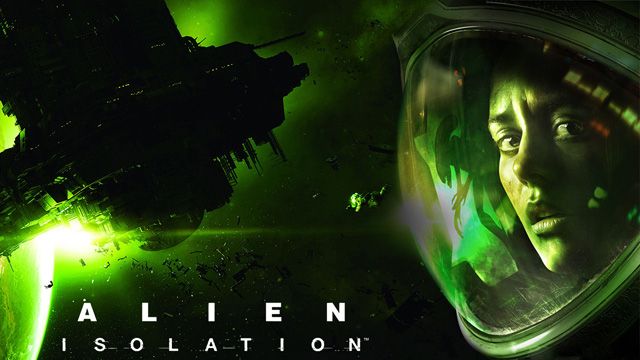
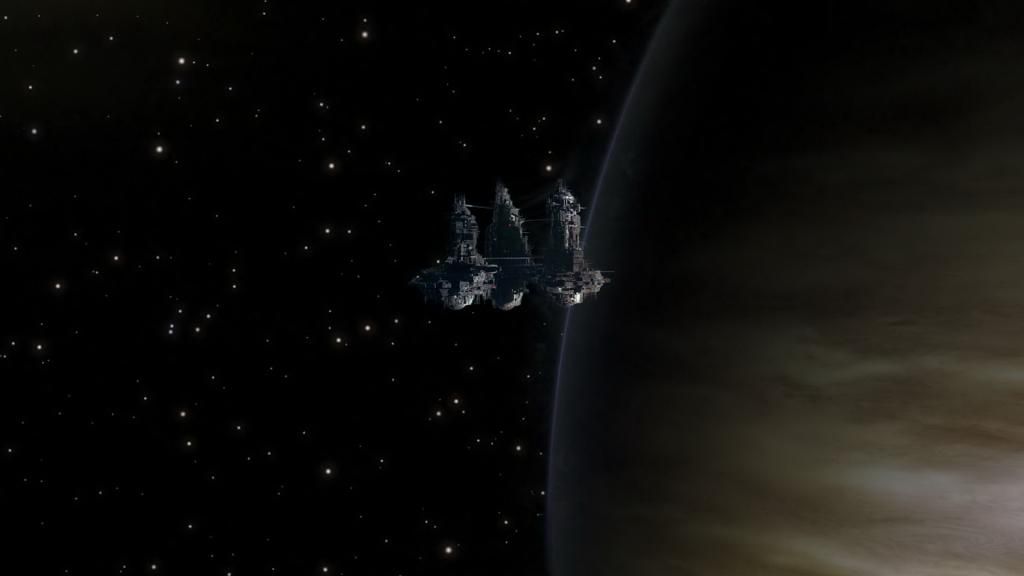
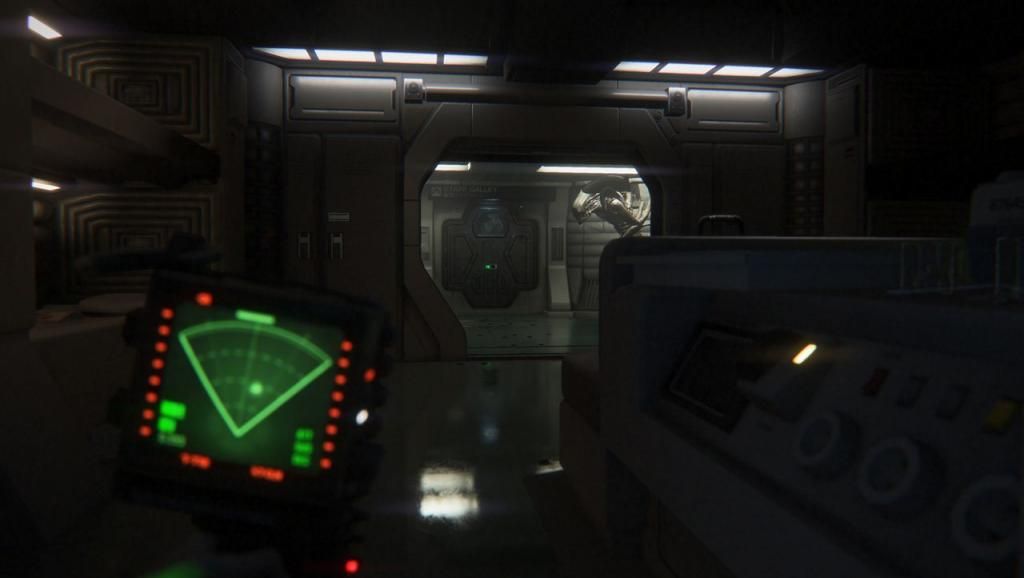
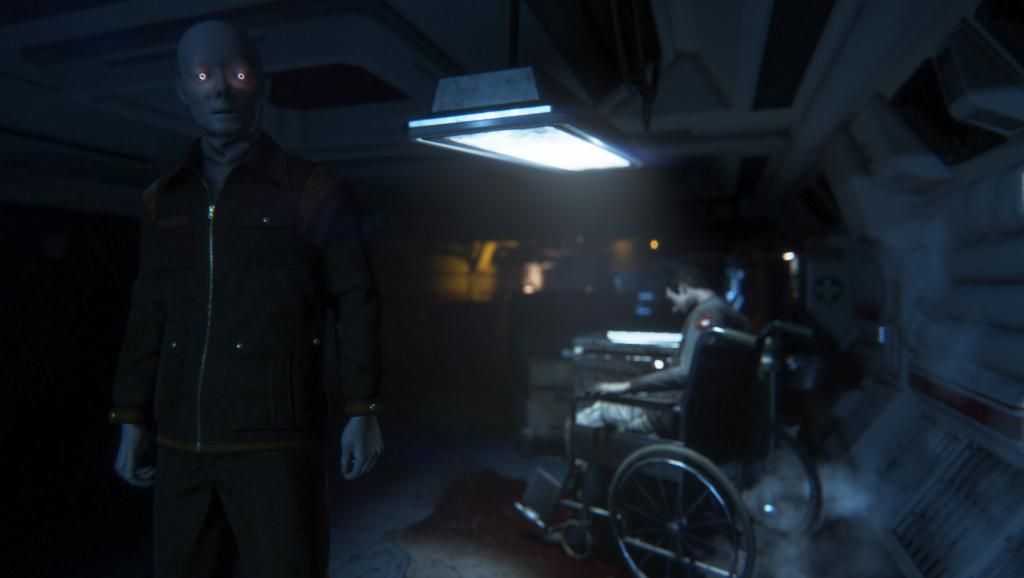
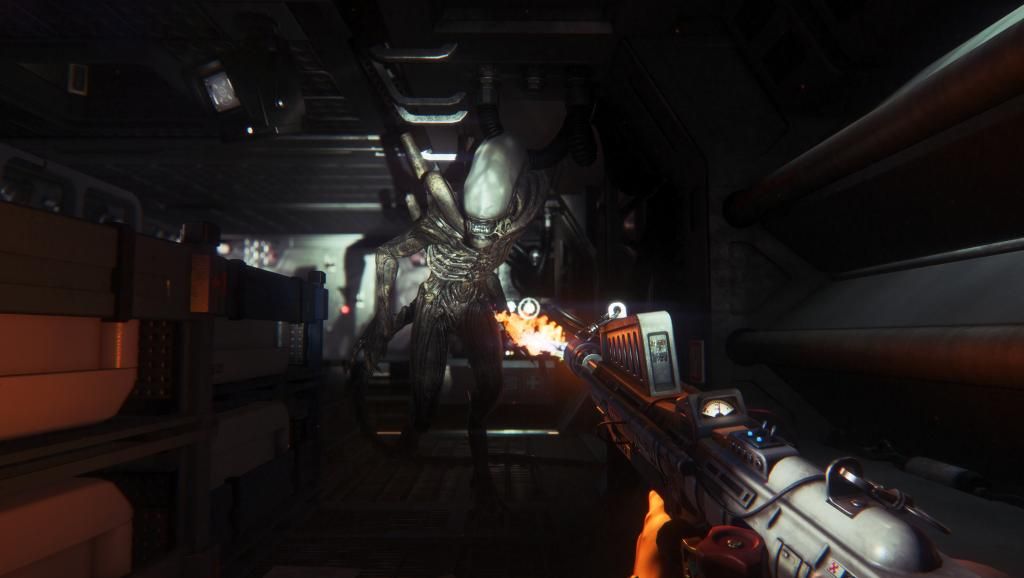
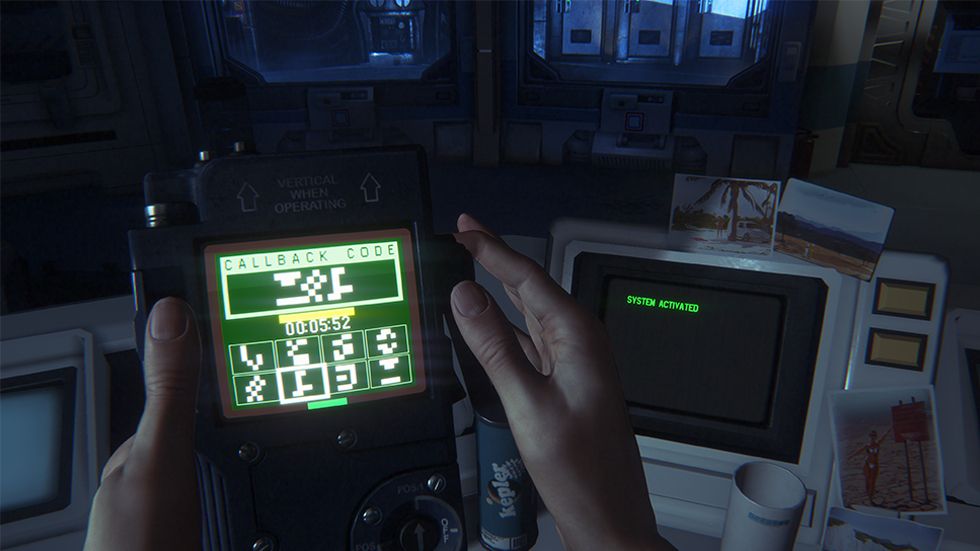
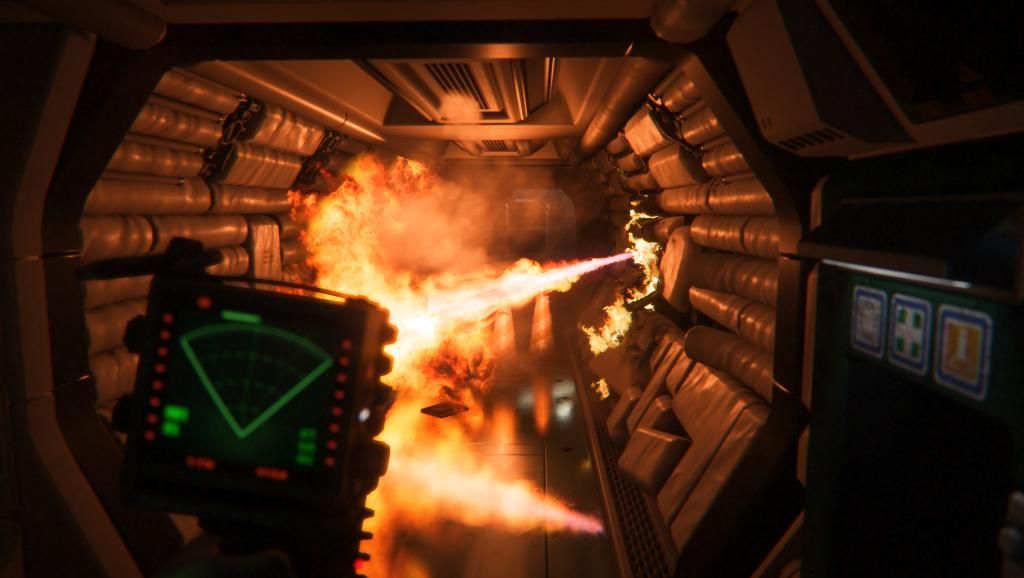
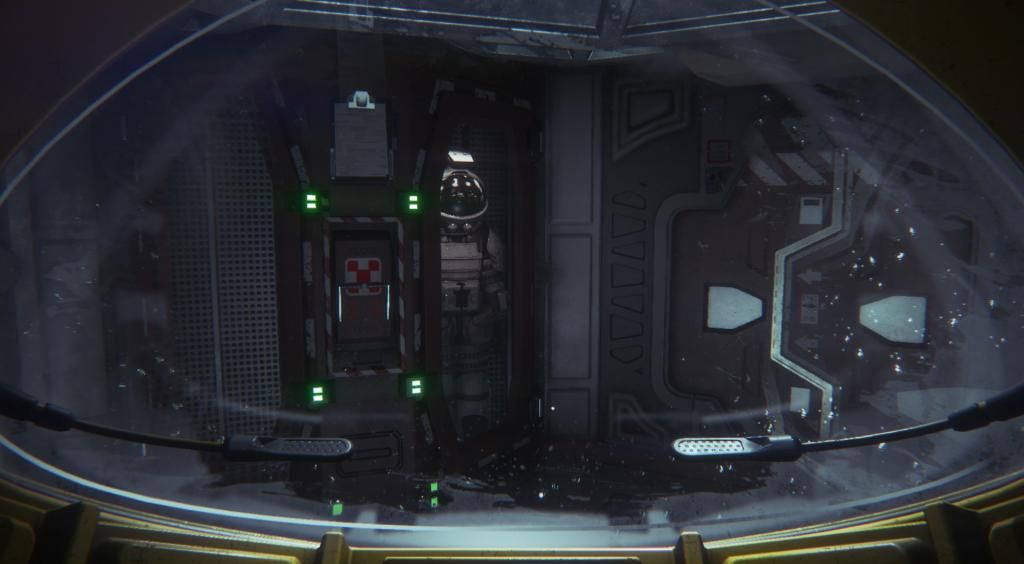


Comments